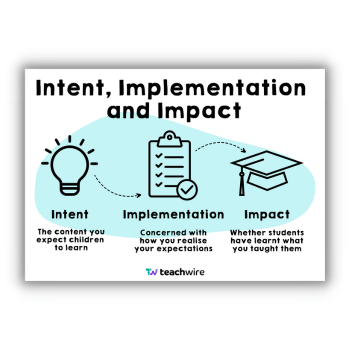Intent implementation impact – What this Ofsted curriculum phrase actually means

Don’t fret about intent, implementation and impact – former Ofsted chief inspector Amanda Spielman laid out exactly what it means…

- by David Didau
- Writer, speaker & senior lead practitioner for English at OAT Visit website

The phrase ‘intent, implementation, impact’ first came to light in 2019 when the new Ofsted inspection framework was launched.
The big shift in focus was away from inspectors attempting to judge the quality of teaching and learning by observing lessons. Instead, the focus is now on attempting to judge the quality of education a school provides by, at least in part, interrogating its curriculum.
JUMP TO A SECTION
To assist schools in assessing the quality of their curriculum, Ofsted has divided matters into three baskets. These are intent, implementation and impact.
The focus on ‘intent, implementation, impact’, perhaps predictably, caused some school leaders to panic. Some began to insist that teachers rewrote planning documents, taking the ‘three Is’ into account. This massively added to teacher stress and workload.
In my visits to schools and conversations with headteachers I’ve become aware that there is much confusion and concern about what Ofsted are looking for and what schools are expected to do.
What does ‘intent, implementation, impact’ mean?
When it comes to the phrase ‘intent, implementation, impact’, former Ofsted chief inspector, Amanda Spielman, laid out exactly what her expectations were. She said, “What I want school leaders to discuss with our inspectors is what they expect pupils to know by certain points in their life, and how they know they know it. And crucially, what the school does when it finds out they don’t!”
So, how does this square with the ‘three Is’? Well, it really isn’t that complicated.
Intent
The intent of the curriculum has nothing whatsoever to do with why you’ve decided to teach certain topics. Neither is it about coming up with vague mission statements such as getting all children to fulfil their potential and become life-long learners.
The intent of the curriculum is the content you expect children to learn. More simply, the intent of the curriculum is the curriculum. Or as Spielman puts it, “what [school leaders] expect pupils to know by certain points in their life”.
“The intent of the curriculum is the content you expect children to learn”
If you find that you’re teaching things that you don’t care whether students will remember or not, then you probably haven’t got this quite right.
Implementation
The implementation of the curriculum is concerned with how you realise your intentions. This is less about your pedagogical preferences than it is about the order in which children encounter the concepts and content teachers want them to learn about.
Staff members should be able to articulate whether there’s a logical connection between studying x in term 1 and y in term 2. Does what students learn about in one year connect to what they learn in another?
“The implementation of the curriculum is concerned with how you realise your intentions”
If you can explain why you teach your curriculum the way that you do, then you’ve probably got a decent handle on the implementation of your curriculum.
Impact
The impact of the curriculum lies in whether students have learnt the things you’ve taught them. How do you know whether pupils know what you think they know? And also, as Spielman puts it, “what the school does when it finds out they don’t”.
“The impact of the curriculum lies in whether students have learnt the things you’ve taught them”
This seems to require some sort of internal assessment. After all, how will you know whether students have learnt what you wanted them to learn unless you assess whether they have?
But, crucially, Ofsted’s former deputy director for schools, Matthew Purves, said that because no one can be confident in the reliability or validity of schools’ assessment, “inspectors will not look at school’s internal progress and attainment data.”
The bottom line
The good news is that there is now no external pressure for schools to produce spreadsheets, flightpaths or any other of the byzantine number systems which have proliferated in recent years.
What will matter, is whether teachers can say something like, “I’m pretty sure that most students have learnt what I’ve taught them because they were able to recall it independently weeks or months after we last discussed it in class.”
The bottom line is this: school leaders should be able to demonstrate:
- what, specifically, children are supposed to learn
- how you go about teaching these things
- how you know whether children have learnt what was taught
It’s as simple (and as difficult) as that.
David Didau is an independent education consultant and writer. He blogs at learningspy.co.uk and you can follow him on Twitter at @DavidDidau.
Intent, implementation, impact examples
So what does this all mean in practice? We hear from two educators about the questions they asked themselves and the prep work they did when thinking about the three ‘i’s in their particular subject area…
Intent, implementation and impact in PE
PE and sport lead Felicity Gardiner explains how to cover intent, implementation and impact when planning your PE curriculum:
Intent in PE
- Make sure that your curriculum is ambitious for all pupils and enables them to make good progress
- Have a clear idea of what you want pupils to learn and achieve
- Collaborate with stakeholders to get their thoughts on the outcomes you want to achieve
- List all the ways PE contributes to your school and what pupils gain from it
- Example: we want pupils to experience and develop leadership skills. Our ‘active lunchtimes’ initiative and the sports teams we run help us to achieve this
Implementation in PE
- Have your long-term plan ready to show the inspector
- Make sure there is coverage across all year groups so that the skills you want to develop can build on prior knowledge
- Ensure that your teachers have the subject knowledge to teach PE well
- Carry out an annual audit of staff needs. Set up a programme of CPD to support the teaching of PE
- If you employ coaches, ensure they know what is being taught and how
Impact in PE
- Be ready to explain why you use the assessment method that you do
- Example: we don’t use formal assessments such as completion of skills grids, but we informally RAG rate key skills for units. When layered, this gives us a clear picture of pupils’ abilities
- Think about how you teach broader life skills that pupils can take into other areas of life
Read advice for preparing for PE deep dive questions.
Intent, implementation and impact in science
Educational consultant and blogger Danny Nicholson sets out what to consider when thinking about how to ensure your primary science curriculum covers the three ‘I’s:
Intent in science
- What does your curriculum intend to do?
- What do you want pupils to learn?
- Are there specific skills you want them to learn?
- What do your teachers think is the objective of teaching science?
Implementation in science
- How do you put your curriculum plans into action?
- Explain how you ensure that your intent is being carried out
- How likely is it that the teaching methods used will deliver your objectives?
Impact in science
- What progress do children make?
- Have the children learnt what they are meant to?
- Have pupils gained the knowledge and skills they need?
Download a free intent implementation impact poster.










